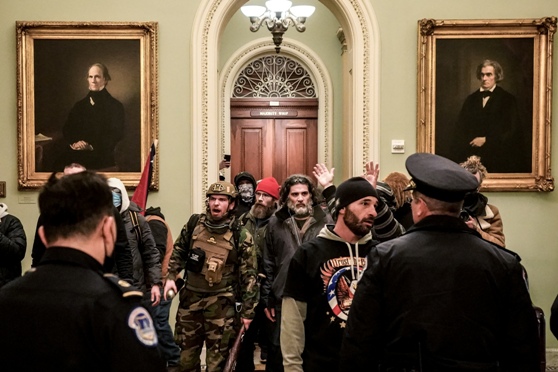Biden administration forms blueprint to combat domestic extremism

By Zolan Kanno Youngs
WASHINGTON — The Biden administration is aiming to bolster information sharing with technology companies, potentially expand hiring of intelligence analysts and improve screening of government employees for ties to domestic terrorism as part of a much-anticipated plan expected released Tuesday (15) detailing how the federal government should combat extremism.
President Joe Biden ordered the review of how federal agencies addressed domestic extremism soon after coming into office, part of an effort to more aggressively acknowledge a national security threat that has grown since the Capitol riot on Jan. 6.
The 32-page plan synthesizes steps that have been recommended by national security officials — including bolstering relationships with social media companies and improving information sharing among law enforcement agencies — into one blueprint on how to more effectively identify extremists in the country after years of heightened focus on foreign terrorists.
“We cannot ignore this threat or wish it away,” Biden wrote in the strategy document. “Preventing domestic terrorism and reducing the factors that fuel it demand a multifaceted response across the federal government and beyond.”
But the plan, titled ‘National Strategy for Countering Domestic Terrorism’ and issued by the National Security Council, also left some questions unanswered.
The new strategy was widely expected to detail a position on whether the government should establish a domestic terrorism law that prosecutors could use to investigate and charge home-grown extremists instead of relying on assault, murder and hate crime charges. The strategy instead indicates that the administration is focused for now on bolstering methods of combating extremism already used by the government, despite Biden calling for such a law during the presidential campaign.
While there is increasing bipartisan support to equip prosecutors with more laws to crack down on extremists, civil rights advocates have expressed concern that new statutes would lead to government overreach and infringements on privacy rights. The administration referred the issue to the Justice Department for further review, according to the planning document.
“New criminal laws, in particular, should be sought only after careful consideration of whether and how they are needed to assist the government in tackling complex, multifaceted challenges like the one posed by domestic terrorism and only while ensuring the protection of civil rights and civil liberties,” according to the strategy document.
Other efforts to investigate extremism, including a commission to examine the attack on the Capitol, have been stymied by Republicans fearing the potential political damage of increased attention on an attack by a pro-Trump mob.
The assessment lists attacks perpetrated by those across the political spectrum, including the fatal shooting of five police officers in Dallas in 2016, a shooting at a congressional baseball game in 2017 and the siege on Congress on Jan. 6.
But the strategy was also the latest in a series of assessments issued by Biden labelling white supremacists and militia groups the most lethal threats among domestic extremists. The danger from such groups has not subsided, the document said.
Such individuals continue to be motivated by “narratives of fraud in the recent general election, the emboldening impact of the violent breach of the US Capitol, conditions related to the COVID-19 pandemic and conspiracy theories promoting violence” and will almost certainly “try to engage in violence this year,” according to the strategy document.
The plan also describes how domestic extremists are establishing connections with groups overseas that share similar ideologies.
Racist extremists “who promote the superiority of the white race” are among the domestic extremists with “the most persistent and concerning transnational connections because individuals with similar ideological beliefs exist outside of the United States,” according to the strategy document.
The Treasury Department is being directed to investigate those overseas who may be financially supporting domestic extremists. The strategy also says the administration will work to use terrorism watch lists to crack down on groups overseas supporting extremists in the United States.
The administration also requested more than $100 million in the 2022 budget for the potential hiring of prosecutors, investigators and analysts.
A key piece of the plan also directs the federal government to look at its own ranks. The Homeland Security Department announced recently that it would undergo an internal review to root out extremism and white supremacy in its ranks. The Defence Department has also set up a working group to examine how to better vet recruits and educate service members who might be targeted by extremist organizations.
The administration will “augment the screening process” for military recruits and those looking to join federal law enforcement or obtain a security clearance “to prevent individuals who pose domestic terrorism threats from being placed in positions of trust,” according to the strategy document.
The findings echoed earlier analyses released by the Biden administration, which has been quick to emphasize the threat of domestic extremists, a shift from an environment under President Donald Trump in which some homeland security analysts said they were discouraged from even mentioning the term domestic terrorists.
Under Trump, federal agencies were also pressured to divert resources to target the antifa movement and leftist groups despite the conclusion by law enforcement authorities that far-right and militia violence was a more serious threat.
The Biden administration delivered an intelligence report to Congress in March that affirmed the statements of those career officials, calling for more resources to address such home-grown extremists.
-New York Times

